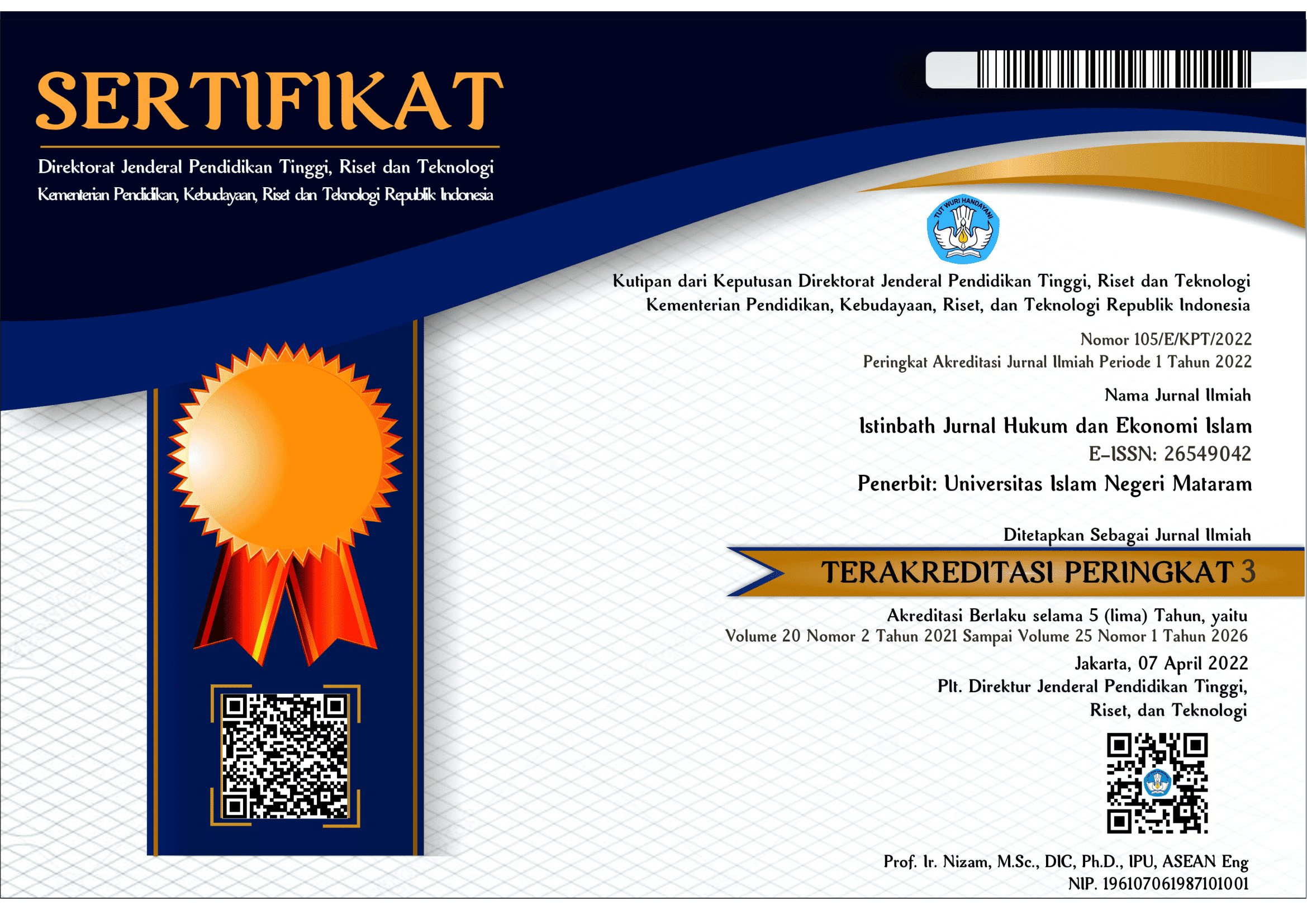SUSTAINABLE PRODUCTIVE WAQF MANAGEMENT OF MANARUL ILMI ITS FOUNDATION PERSPECTIVE OF MAQÂSHID SHARIA
DOI:
https://doi.org/10.20414/ijhi.v24i1.964Keywords:
Management, waqf, Manarul Ilmi Foundation, Maqâshid SyariaAbstract
This research project aims to examine the management of sustainable productive waqf at the Manarul Ilmi ITS Foundation and assess its suitability from a Maqâshid Syariah perspective. It used a qualitative case study approach. Data were collected through interviews with foundation administrators (nazhir), waqf fund managers, and donors (waqif). Additionally, the researchers conducted direct observations of the waqf business unit and analysed supporting documents, such as programmes and financial reports. The results showed that the management of productive waqf at the Manarul Ilmi Foundation includes asset development in the form of waqf funds from alums and benefactors, as well as thematic programmes such as well waqf, mosque design waqf, and scholarships. However, the sustainability aspect has not yet been fully incorporated into long-term strategic planning or social impact measurement. From a Maqâshid Syariah perspective, this management fulfils several aspects, such as hifz al-din (through mosque utilisation and da'wah), hifz al-'aql (through scholarship waqf), and hifz al-nafs (through well waqf). However, the hifz al-mal aspect still requires improvement in efficiency, transparency, and reinvestment of waqf proceeds. This research recommends that foundations develop a productive waqf governance system based on sharia maqâshid indicators, strengthening public engagement and institutional documentation to ensure the long-term benefits of the waqf.
References
Ainulyaqin, M. H., Achmad, L. I., & Meilani, M. A. (2023). Peningkatan Kesejahteraan Santri Berbasis Manajemen Pengelolaan Wakaf Produktif di Pesantren Assyifa Subang. Jurnal Ilmiah Ekonomi Islam, 9(1), 221–228. https://www.jurnal.stie-aas.ac.id/index.php/jei/article/view/7951
Amini, A. R., Sumadyo, A., & Marlina, A. (2019). Penerapan Prinsip Arsitektur Industrial Dalam Produktifitas Ruang Pada Solo Creative Design Center. Penerapan Prinsip Arsitektur Industrial Dalam Produktifitas Ruang Pada Solo Creative Design Center, 2(2), 395–404. https://jurnal.ft.uns.ac.id/index.php/senthong/article/view/1058
Fad, M. F. (2021). Wakaf Linked Sukuk Dalam Perspektif Maqashid Syari’ah. Journal of Islamic Studies and Humanities, 6(1), 44–62. https://doi.org/10.21580/jish.v6i1.8150
Faisol, M. (2017). Pendekatan Sistem Jasser Auda Terhadap Hukum Islam: Ke Arah Fiqh Post-Postmodernisme. Kalam, 6(1), 39. https://doi.org/10.24042/klm.v6i1.393
Fathurrahman, A. (2015). Qawaidh Fiqhiyah Muamalah. https://idr.uin-antasari.ac.id/6804/1/QAWAID FIQHIYYAH. revisidocx.pdf
fatwa MUI wakaf uang, A. L. (2002). "Kamu sekali-kali tidak sampai kepada kebaijakan (yang sempurna), sebelum kamu menafkahkan sebahagian harta yang kamu cintai. Dan apa saja yang kamu nafkahkan, maka sesungguhnya Allah mengetahuinya "(QS. Ali Imron [3]:92). 2. 1–15.
Hazami, B. (2016). Peran dan aPlikasi Wakaf dalam meWujudkan kesejahteraan umat di indonesia. 16(1), 173–204. https://ejournal.radenintan.ac.id/index.php/analisis/article/view/742
Helim, A. (2019). Maqasid Syariah versus Ushul Fiqh (Konsep dan Posisinya dalam Metodologi Hukum Islam). 214.
Hidayatullah, R., & Saiin, A. (2025). Dinamika Hukum Wakaf di Indonesia Tantangan dan Solusi dalam Pengelolaan Aset Wakaf Produktif. Al Barakat: Jurnal Kajian Hukum Ekonomi Syariah, 5(01), 11–23. https://journal.stishusnulkhotimah.ac.id/index.php/al-barakat/article/view/274
Indonesia, B. W. (2016). Fenomena Wakaf di Indonesia.
Laila, N. (2019). Pengembangan Sukuk Negara Di Indonesia: Analisis Komprehensif dalam Menggali Alternatif Solusi dan Strategi Pengembangan Sukuk Negara Indonesia. 218.
Medias, F. (2010). Wakaf Produktif Dalam Perspektif Ekonomi Islam. La_Riba, 4(1), 71–86. https://doi.org/10.20885/lariba.vol4.iss1.art5
Mulyono, S. H. (2020). Peran Wakaf Sebagai Instrumen Keuangan Publik Dalam Perekonomian. Kasaba: Jurnal Ekonomi Islam, 13(2), 122–137. https://ejournal.uika-bogor.ac.id/index.php/Kasaba/article/view/3665
Prof. Dr. Duski Ibrahim, M. A. (2019). Al-QawaâId Al-Maqashidiyah.
Rahayu, R. D., & Agustianto, M. A. (2020). Analisis Implementasi Cash Waqf Linked Sukuk (CWLS) Perspektif Prinsip Ekonomi Syariah. Management of Zakat and Waqf Journal (MAZAWA), 1(2), 145–161. https://doi.org/10.15642/mzw.2020.1.2.145-161
Rahim, A. (2019). Peran Wakaf Dalam Pengembangan. Al Qalam, 13(1), 89–102.
Sutisna, D. (2020). Panorama Maqashid syariah.
Ubaidillah, M. (2024). Peluang Dan Tantangan Pengembangan Wakaf Produktif Di Kabupaten Pekalongan. 8(1), 61–69.
Yaqin, A. (2018). Rekonstruksi Maqâshid al-Syarî`ah dalam Pengembangan Metodologi Hukum Islam (Kajian Eksploratif Pemikiran Jasser Auda). Madania: Jurnal Kajian Keislaman, 22(1), 63. https://doi.org/10.29300/madania.v22i1.803
Yin, R. (2016). Case Study Research and Applications. In Theory and Methods of Metallurgical Process Integration. https://doi.org/10.1016/b978-0-12-809568-3.00016-4
Downloads
Published
How to Cite
Issue
Section
License
Copyright (c) 2025 Roby Julio Pratama, Abdul Wahab, Dian Berkah

This work is licensed under a Creative Commons Attribution-ShareAlike 4.0 International License.





